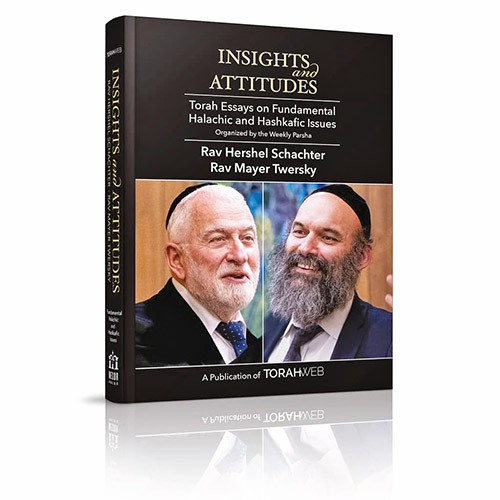
Editor’s note: This series is reprinted with permission from “Insights & Attitudes: Torah Essays on Fundamental Halachic and Hashkafic Issues,” a publication of TorahWeb.org. The book contains multiple articles, organized by parsha, by Rabbi Hershel Schachter and Rabbi Mayer Twersky.
The Torah tells us that a kosher animal is one which has split hooves and chews its cud. Pigs have split hooves, but because they do not chew their cud, they are not kosher. The rabbis of the Midrash (Bereishis Rabba 65:1) tell a parable of a pig stretching out a leg in order to display its split hooves and attempt to fool everyone into believing that it is kosher.
Esav, Yaakov’s twin, claimed to follow the same tradition as Yaakov. When Yaakov departed for Padan Aram to marry a girl from the family, Esav followed suit and also married a girl “from the family,” but he did not divorce his non-Jewish wives. This act of marrying a “girl from the family” was solely in order to appear as though he were following in the footsteps of Jewish tradition.
The so-called Judeo-Christian tradition is merely a facade. Despite the fact that the two brothers were twins, and had a lot in common biologically, they had very little in common in terms of lifestyle. There is an oft-quoted midrash (cited by Ritva Kiddushin 49b, s.v. tisha) which states, “Why is the pig called a ‘chazir’? Because someday in the future, God will give it back (“lehachziro”) to the Jewish people.” The Rishonim ask how this can be. The Rambam postulates, as one of the thirteen principles of our faith, that the laws of the Torah will never change. Can it be that someday it will be permissible for us to eat pork?
Some of the Rishonim explained that “the return of the pig” does not refer to eating pork, but rather to the restoration of the Jewish government in place of the Christian one. The “pig” is the faker who makes believe that he is kosher by showing his split hooves, just as Christians claim that theirs is a twin-religion with ours, and just as Esav was a twin brother of Yaakov.
The prophet Malachi points out in the haftara that the fact that they were twins has nothing other than biological significance: “ואהב את יעקב ואת עשו שנאתי” — “I love Yaakov, while I have rejected Esav, and I disdain him” (Malachi 1:2-3). Throughout the generations, the Jewish people have adopted a dual position vis-à-vis the Christians and mankind. Namely, the position of Avraham Avinu in the beginning of Parashas Chayei Sara: we exist as both strangers and citizens with respect to the rest of mankind. Regarding fighting crime, terror, disease, poverty, improving the economy, and delving into the science of nature, we are equal partners, and all work together. But, with respect to the purpose of our lives, and lifestyle—the Jewish people feel “as strangers,” and share nothing in common with anyone else. We are “עם לבדד ישכן” — “the nation that lives alone” (Bamidbar 23:9), and will always remain so. The Jews live alone, die alone, and are buried alone. When Ruth converted and joined the Jewish people, she said to her mother-in-law Naomi,
“אל אשר תלכי אלך ובאשר תליני אלין באשר תמותי אמות ושם אקבר”
“Where you go I will go; where you stay, I will stay; the way you will die, I will die; and there too will I be buried” (Rus 1:16-17).
After living for many years in peace and harmony in Eretz Canaan, after the passing of Sara, Avraham Avinu insists on buying her a separate burial plot. The Jew lives differently, dies differently, and is even buried differently to emphasize this point. We share biological similarities with others, and work together with others on many different projects for the purpose of improving man’s position in this world, but we do not share their weltanschauung. “אשר בחר בנו מכל העמים.”
Rabbi Hershel Schachter joined the faculty of Yeshiva University’s Rabbi Isaac Elchanan Theological Seminary in 1967, at the age of 26, the youngest Rosh Yeshiva at RIETS. Since 1971, Rabbi Schachter has been Rosh Kollel in RIETS’ Marcos and Adina Katz Kollel (Institute for Advanced Research in Rabbinics) and also holds the institution’s Nathan and Vivian Fink Distinguished Professorial Chair in Talmud. In addition to his teaching duties, Rabbi Schachter lectures, writes, and serves as a world renowned decisor of Jewish Law.










